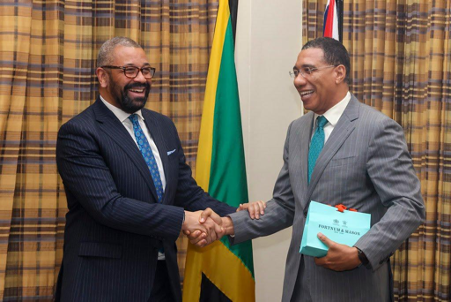By Jenni Campbell, Contributor
Men, from afar, with grim faces and hidden agendas, deep pockets, long bags full of compliments and promises have been making the trek across continents and oceans, one after the other to establish, influence, and reinforce policies designed elsewhere for the benefit of undisclosed masters.
It is like colonisation all over again, only this time the mission is to control the masses through a murky global governance mechanism pegged to centralised power and mad money. This new mission is aided and abetted by the government of the day and is steeped in duplicity, corruption, and greed.
United Nations Secretary-General António Guterres, who arrived last week, said his visit to Jamaica was a part of the global mission to reset the world’s current dysfunctional international financial system, which he described as the “moral, power and practical problems” that are not supporting fair and sustainable development. Using the COVID-19 vaccine experience as a prime example, he reminded Jamaica of the obvious – richer countries could print money, while developing countries could not.
Guterres said the huge global liquidity problem, skewed towards large economies, was outdated and unfair. International rules meant that injustices were institutionalised, with the least developed countries left to the mercy of borrowing and debt mechanisms.
Since the problems were skewed towards the larger, richer, and more powerful countries, one would imagine that the fixes would be at the points of the problem. But here was the UN Secretary-General, in Jamaica, a poor nation, at a point of least resistance, asking one of the most affected states to make further adjustments.
Vulnerable to external and internal shocks
It must be understood that small island developing states are usually vulnerable to all sorts of external and internal shocks. They are affected by the global supply chains because they rely heavily on imports and remittances. Many are wide open to physical shocks from natural disasters, from which they hardly ever recover. So small states are in urgent need of global protection, which has always been promised but never delivered. But, regardless of how they are bent out of shape because of real economic challenges, these small states have always been readily responsive, laying out the red carpet to requests from up North. Their certain response is only to ask how high for every request to jump.
In fairness to the UN chief, he said he would be addressing the G7 and the G20 when they next meet, “and insist” that these moral, power, and practical dimensions are to be properly addressed. This is not the first time that these top-flight meetings had to be called out on these issues.
Barbados Prime Minister Mia Mottley made an impassioned plea to these same heads of states about these same issues not long ago, but we wish the UN Secretary-General well in adding his own voice to the cause.
While in Jamaica, Guterres wasted no time boosting the local culture and the oversized ego of the Jamaican Prime Minister.
Guterres paid tribute to Jamaica’s ability “to invade peacefully the whole world, with its culture, its music, and its art” over recent decades, proving that diversity in the post-colonial era can be a “richness, not a threat”, as long as the right policies are adopted.
He described Mr. Holness as a champion “in relation to climate action and a champion in relation to an effective, reformed multilateral financial architecture in the world.”
Advancing towards a cashless society
And with his ego well boosted and like a mascot for big money and global influence, Jamaican Prime Minister Andrew Holness jumped Blue Mountain-high and committed the island to advance towards a cashless system, which is a major plank in the global reset agenda. Holness voiced no consideration for the majority of Jamaicans who remain unbanked and cash-dependent.
Close on the heels of the UN Secretary-General, the British Foreign Secretary James Cleverly arrived. The British High Commission said the four-country tour by the Foreign Secretary was aimed at cementing partnerships on climate, people, and peace.
Cleverly, the Foreign Secretary announced some £22 million in funding for Jamaica to help with violence prevention and address organised crime, as well as climate financing aimed at protecting vital sites against flooding and coastal erosion.
This special visit and money come at a time when Jamaica is engaged in a process of ditching King Charles as its Head of State and becoming a Republic.
It comes nearly three months after Canada, which has been the chief financier of justice reform across the region, increased its support for Jamaica’s efforts by some $12 million Canadian dollars.
Push for justice reform
The new Canada push aims to strengthen and promote a rights-based and gender-sensitive justice system, targeting groups – women and girls, vulnerable groups, men and boys, adolescents, and people who have difficulty accessing justice.
The shrouded remit behind the Canadian dollars is to push the unrighteous LGBTQI agenda through justice reform and to change the island’s Constitution, in particular to decriminalise buggery.
Already, the Minister of Education has announced that schools are to be drafted into the well-intentioned restorative justice programme, financed by Canada, and which is being used as a grand cover to change attitudes towards same-sex relations.
These foreign interventions that are being embraced and rolled out in tandem with our government are not too concerned about the fact that large segments of the Jamaican population are near the point of starvation and that many are fast falling beneath the poverty line as the cost of living skyrockets out of reach.
Forget the fact that things are getting tighter across the land. Some 500,000 Jamaicans cannot feed themselves or their families. Governor General Sir Patrick Allen, the local representative of the British Monarchy, in 2021 cited statistics that indicate that each night one in six people in Jamaica goes to bed hungry. In this 2023, the people are getting hungrier and angrier.
The concerns from up north, as articulated by the well-appointed visitors, are climate change, how Jamaica can help restore stability in Haiti, organised crime, and how Jamaica can adjust its economy to fit into the global reset.
Dragged in the middle
Jamaica is being dragged into the middle of a global power re-alignment with no regard for the hearts or concerns of the ordinary people, no real understanding of the powerful international agendas at work, total ignorance of the spiritual warfare at play and with absolutely no resistance.
We have arrived at the proverbial brink and are looking over into the abyss. In the midst of this dangerous reality, the people we trust the very least, led by the Minister of Finance, have rewarded themselves the most.
The government is always ready to jump; always wide open for all things foreign, including unreasonably increasing its own salaries beyond its overseas counterparts; caving in to outside agendas; changing the Constitution at the behest of big money; ditching the Privy Council; declaring States of Public Emergencies on a whim; ignoring the plight of the people; sidelining the Christian Church; beating its chest and desks in Gordon House; and everything else.
But the people are beginning to pay attention. They now see that if the government is not for us, they must be against us and our God.
The true Christian Church is arising, returning to the old landmarks, rebuilding Righteous Altars and calling on the God of our salvation. Let it be known: Jamaica does not belong to the gods of the globe. Jamaica belongs to Jesus Christ of Nazareth.





